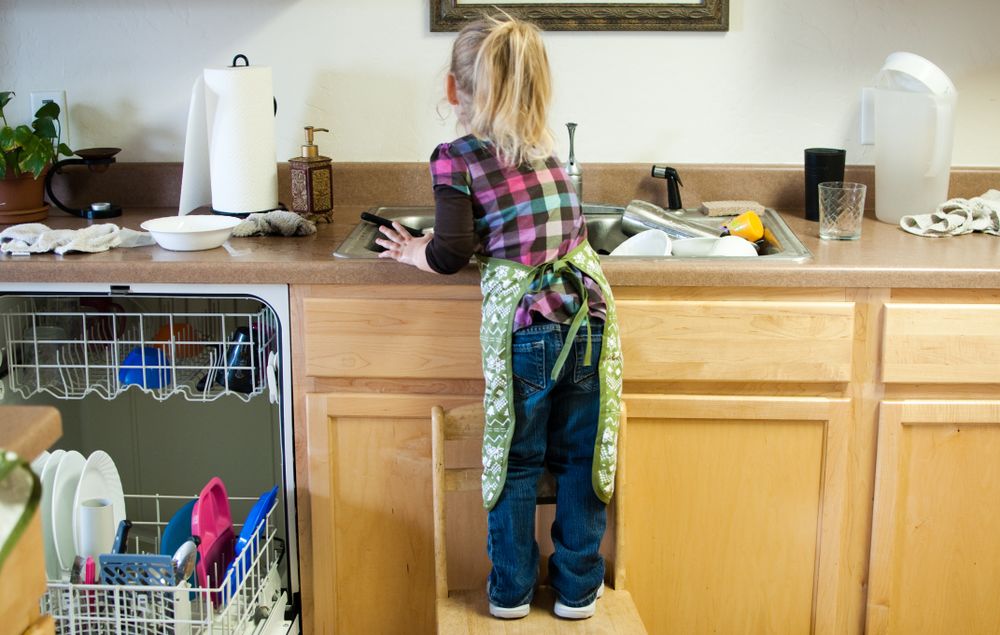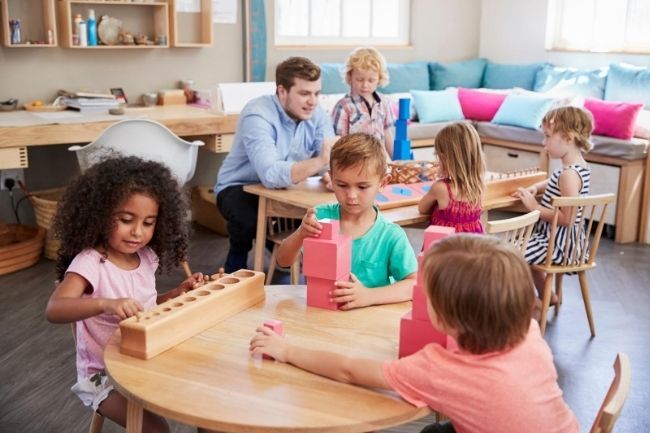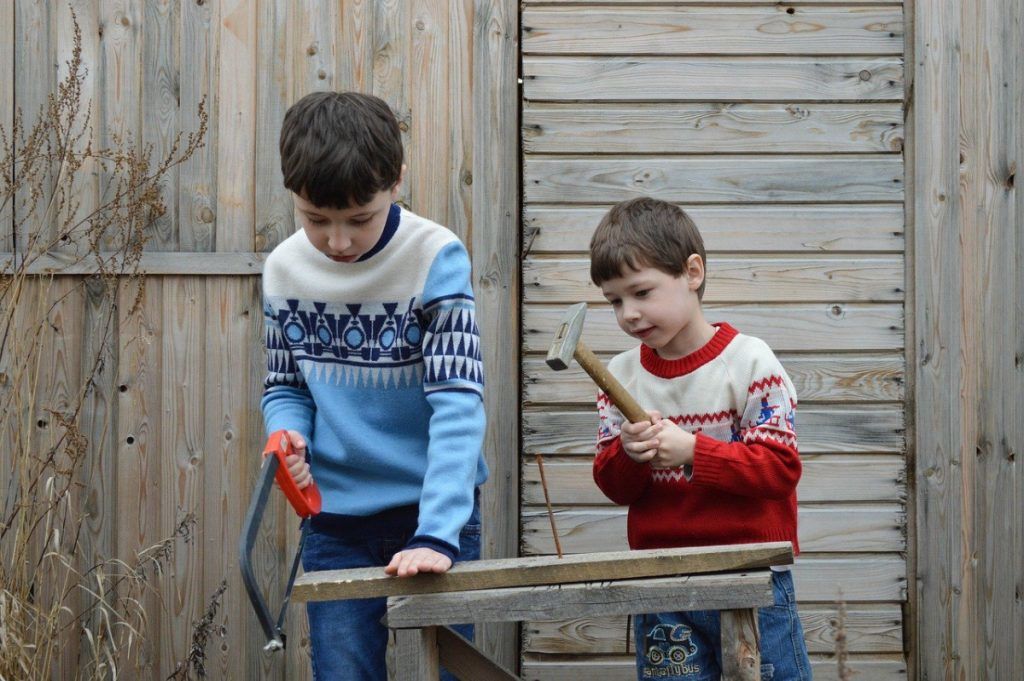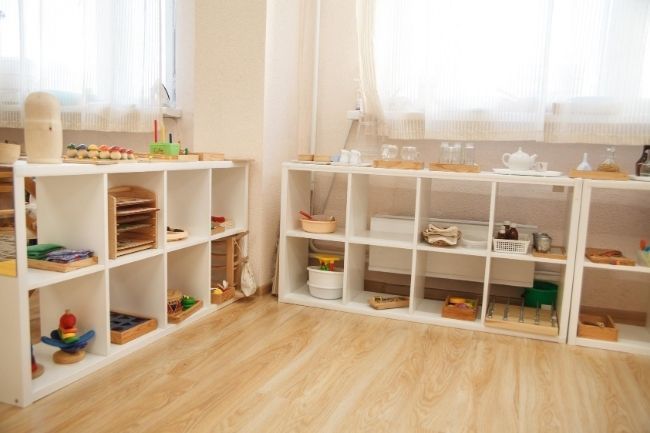What You Should Know About Your Child Montessori
Y'all might have come across Montessori education while looking for parenting tips, toys, or the name popped-upward during conversations about kindergarten options.
What is the Montessori Philosophy?
Montessori is a method of instruction, adult by Italian doctor Maria Montessori in the early 1900s, about 150 years ago. Past carefully observing the way children human activity, play, and learn, Maria Montessori decided to create a school that aimed to support their natural development with a kid-led approach in heed.
Ok, only what does that actually mean?
Montessori is an educational approach that focuses on "following the kid". For example, instead of deciding what children will acquire every mean solar day, each child decides for themselves past choosing from activities that were prepared for them, specific for their age and stage of development. This allows them to learn at their ain stride, independently, cultivating cocky-motivation.
"Montessori education is about guiding children to learn independently and reach their unique potential. Children have the liberty to engage in their own learning experience and the Montessori teacher (or parent) is in that location to support the child throughout this process."
Maria Montessori
Montessori instruction relies on a couple of primal principles. Here are some of them listed below to help you improve understand what Montessori actually ways:
1. Respect for the child.
Each kid is different and has a unique development pace. According to Montessori, in that location is no comparison between children and each child receives the support and the help that they need in club to thrive.
The child has a voice that is heard and respected. If a child is specially interested in something, she can focus on that instead of being forced to do things she has no interest in and therefore probably won't do well in anyhow.

2. Natural learning.
Maria Montessori believed that a child'south mind is absorbent and that they acquire all the time. All adults can do is expose the kid to different experiences and environments and permit them to build their understanding of the globe.
Instead of lots of toys, Montessori parents should invest in practical items to aid the toddler become to know the world.
3. A prepared environment.
Montessori learning covers 5 principal areas of learning: practical life, sensorial, mathematics, culture, and language.
Children learn and teach themselves through the exploration of all these five areas, that they prioritize by pick and preference.
The developed's responsibleness is to prepare the environment with the necessary resource and tools and to encourage children to freely discover the world around them and learn about it by doing.
4. Uninterrupted work cycles.
In a Montessori classroom, there are work cycles that concluding for about 2-three hours. This must be uninterrupted fourth dimension so that every child can practice their focus.
This long time too allows children to choose materials from various learning areas, chief a task in a particular area earlier moving on to another.

Whether you chose Montessori for your child is entirely up to you lot. It'southward not an platonic philosophy, no didactics method should be called ideal because parents have different preferences and condolement zones. You need to consider pros and cons of Montessori pedagogy to choice whether information technology's practiced for you.
P.S. There's besides zero incorrect with going Montessori only in certain aspects if you lot cannot afford Montessori schoolhouse or simply don't alive nearby any, or aren't comfortable with giving your toddler a real knife.
Pros of Montessori Education:
one. Independence
Montessori is a kid-led approach, which ways the kid learns from an early age to make their own choices and work by and large by themselves on figuring out the world around them, at their ain footstep.
Whether it's learning how to put together a puzzle, assist cooking, become dressed, pour a drinking glass of water, or wash their hands, the child builds the necessary skills to problem solve, persist, ask for help when needed, and to openly communicate their needs and desires.
In the classroom, teachers only assist and guide the children, they mostly observe and don't interfere, unless they see necessary.
This approach gives children slap-up confidence that they can succeed at whatever job they are working on. This also encourages them to follow their progress and self-assess their work, without whatsoever external pressure level or comparison.

two. Cocky-subject field
Although it might seem at first that Montessori allows likewise much freedom by having the activities spread out around the room, it has a lot of rules and routines. Mode more the traditional daycare or kindergarden would offer.
After working with the given material, children e'er put it back on the open up shelf, and then that their friends can discover it in their regular spot and utilize information technology. At that place is a well-divers schedule which includes uninterrupted work time, snack time, outdoor play, lunch, and slumber.
Children get used to this program, learn to respect it, and even help new kids to follow it. Combined with independence and practice, it teaches them self-field of study.
3. Social Skills
The Montessori model implies having multi-age groups of children, that ordinarily span over 3 years (east.m., 0-iii years old, 3-6 years old).
This enables peer-to-peer learning, which comes with dandy benefits. The younger children larn past observing and bear on to practice independently. The older children practice skills such as leadership and develop values by helping the little ones.

four. Love for Learning & Focus
Montessori has a easily-on learning approach, where every kid chooses freely their material and works on it until they reached their goal.
The child doesn't feel pressured into annihilation, so learning becomes a pleasure. Every bit a upshot, without any pressure level, a child tin stay focused and even if they don't primary some skill yet, they assess their progress and maintain their curiosity and eagerness to come back to it the next day.
v. Age-Specific Activities
All Montessori toys and materials are elementary, just challenging and allow repetition and help to develop social, emotional, physical, and cognitive skills.
All the furniture in a Montessori classroom is placed at the children's acme, and then they can easily reach everything that they demand to work, play, eat, or accept care of themselves.
Although placed more chaotically than in a traditional classroom, the Montessori surroundings is uncluttered, make clean, with lots of calorie-free and lots of infinite for free move.

Negatives of Montessori Learning:
1. Cost
Even though Maria Montessori created the philosophy when living in slums, these days Montessori is unnecessarily associated with elitism due to the heavy toll tag of schools and toys.
A Montessori institution is expensive for several reasons. Montessori schools are private and the materials used in classrooms follow certain quality standards that involve higher costs.
Teachers' training is also expensive, equally regular teachers cannot just come up and teach at Montessori schools without additional training and switching their mindset and techniques.
There is no research that definitively proves that Montessori pedagogy is ameliorate than any other education, public or private. For a number of reasons, this is impossible to determine.
Montessori toys & materials avert plastic, thereby oft defaulting to forest. Wood is naturally more expensive than plastic, so the toll rises automatically.
Many companies, such as popular Lovevery subscription (which I don't recommend due to the unnecessary hefty toll tag) just for saying information technology's Montessori, even though their toys aren't really handmade, lots aren't Montessori and in fact, they're fabricated at a giant factory in Red china. You can notice amend and cheaper toys on Etsy.
two. Authentic Montessori is Hard to Find
It might be hard to discover an authentic Montessori kindergarten or school. If it's not an institution that follows the original Montessori principles and so you might not be able to enjoy its benefits.
In that location are many horror stories of parents who tried a and so-chosen Montessori school and explained why it was a disaster.
Here yous tin find a guide on what to pay attending to when choosing a Montessori school.
3. Curriculum is Loose
Some parents have concerns about the lack of a well-defined curriculum and children having too much liberty of choice. They worry that the children won't acquire much with such an approach, equally not every kid can learn without instructions – some people cannot even reach it in college.
Although there isn't a written curriculum for children to follow. The fact that a child could get more than interested in ane area than in another is something yous need to be ok with if you cull Montessori.
If your child doesn't similar math they won't practise it and then in some aspects they tin fall backside other kids that attend a traditional schoolhouse. Subjects are proposed and presented, simply a kid is never pressured into developing a certain skill.
On the other mitt, some people see also much structure in Montessori educational activity, with little flexibility. It depends on what is comfortable and acceptable to each family. If you're traveling a ton and don't like schedules and so Montessori education might not be for you.
4. Focus on Independence Can Be Bad
It'southward difficult to say place it here, but some see encouraging a lot of independence as a disadvantage. Fostering independent piece of work raises the concern of children having difficulties working in teams and collaborating later in life. It'south often harder for Montessori kids to follow different rules they're used to.
It's good to keep in mind that encouraging your child to exercise things independently requires a lot of patience and guidance and peradventure a quicker let go of your hand while taking a walk.

5. Creativity and Playtime is Taking Away Earlier
Montessori doesn't accept childhoods away, merely focuses on existent-life skills instead of giving children the freedom to play and explore. Montessori kids focus on practicing life skills and the demands of many institutions are high for their age.
For instance, if an xviii-month-erstwhile isn't potty training even so or cannot utilise the spoon perfectly information technology may be considered as falling behind. However, the truth is that non all kids start doing things at the same fourth dimension – some walk at 9 months and others don't until 18 months, but in both instances, at that place's nix wrong with the child.
Montessori philosophy is a style of living, not only an educational method because it covers everything, the physical, cognitive, social, and emotional development of your child. So, earlier you determine, keep in mind that you should feel comfortable with what Montessori brings to the table and how information technology volition shape your child.
Source: https://annainthehouse.com/pros-and-cons-of-montessori-education/
Post a Comment for "What You Should Know About Your Child Montessori"